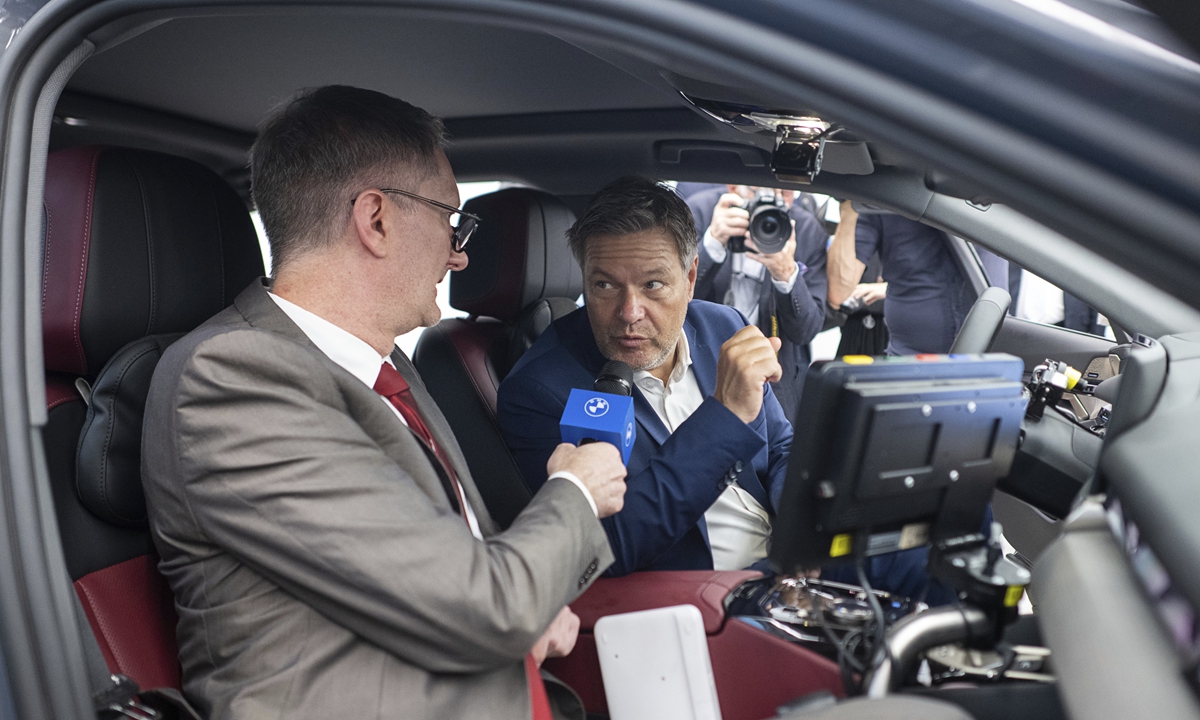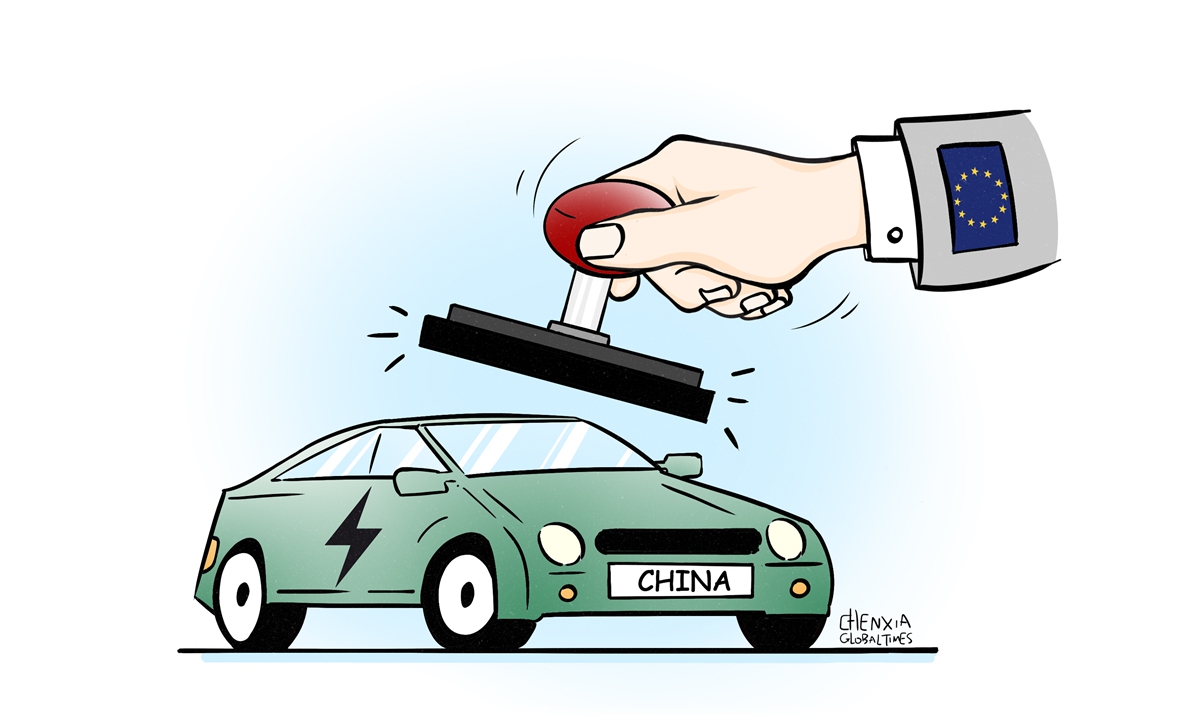Illustration: Chen Xia/Global Times

German Vice Chancellor Robert Habeck (right) sits in a BMW i5 during a tour of a BMW research center in Shanghai as part of a visit to China on June 23, 2024. Photo: VCG
China and the EU on Saturday agreed to launch consultations on the anti-subsidy investigation into Chinese electric vehicles (EVs). Chinese observers said the move underscores China’s utmost sincerity in seeking to resolve trade disputes through talks, while showing EU officials’ concerns about the adverse impact on European companies and consumers if the European Commission (EC) pushes ahead with its politically-driven tariff scheme.
Observers said the best outcome the Chinese side wants is that the EC, the executive body of the EU, scrap its tariff decision before July 4 and abide by WTO rules.
They urged the EU to address disputes from facts and China-EU economic and trade cooperation rather than being disrupted by political factors, especially US pressure.
The scale of China-EU economic and trade cooperation is huge and the two sides are mutually dependent with strong economic complementarity. The EU’s increasingly protectionist moves will definitely trigger countermeasures from the Chinese side, and an escalation in trade frictions will lead only to lose-lose results for both sides, they said.
Ready for dialogue
China’s Commerce Minister Wang Wentao and Valdis Dombrovskis, executive vice president of the EC, agreed on Saturday to start consultations on the issue of the EU’s anti-subsidy investigation into Chinese EVs. The consensus was reached during talks between the two officials via video link, the ministry said in a press release on its website.
The announcement came after Wang said during a meeting with German Vice Chancellor Robert Habeck also on Saturday that China stands ready for dialogue and consultations on EVs if the EU is willing to sit down at the negotiating table with sincerity.
Zhang Jian, a vice president of the China Institutes of Contemporary International Relations, told the Global Times on Sunday that the Chinese side has shown the utmost sincerity in seeking to resolve disputes through consultations.
Some member countries’ strong opposition to the EC’s planned tariffs on Chinese EVs as well as China’s vow to take “necessary measures” to firmly defend its legitimate rights and interests prompted the EC to conduct consultations with the Chinese side, according to Zhang.
It is hoped that the EC can drop its decision of imposing provisional tariffs on Chinese EV imports through consultations and abide by WTO rules, he said.
During the meeting with Wang, Habeck said the German government is deeply concerned about the EU’s anti-subsidy investigation into Chinese EVs, which will negatively impact Europe’s green transition and consumer interests.
“Overall China-EU relations will be increasingly eroded if the EC goes ahead and imposes tariffs on Chinese products, disregarding the Chinese side’s efforts to engage in friendly consultations,” Sun Yanhong, a senior research fellow at the Institute of European Studies of the Chinese Academy of Social Sciences, told the Global Times on Sunday.
Sun said the upcoming consultations on the anti-subsidy investigation into Chinese EVs may be extremely difficult, as some politicians in Europe have politicized and weaponized economic and trade issues.
“The EU’s accusation of ‘overcapacity’ in China’s EV sector is groundless. The investigation process has been filled with unfair and opaque practices, and the ruling is also unfair,” Sun said, calling on the EU to address the China-EU dispute on Chinese EVs from an economic perspective instead of being politically impacted.
EU bears full blame
The Chinese Commerce Ministry (MOFCOM) said on Friday that the EU side bears full responsibility, as it continuously escalates trade frictions with China, which could trigger a “trade war,” in response to media reports of various industries in the EU expressing concerns about escalating trade tensions potentially prompting a “trade war.”
Since the beginning of this year, the EU imposed 31 restrictive trade and investment measures against China, 25 of which were trade remedies, seriously undermining China-EU economic and trade cooperation, according to MOFCOM.
New information obtained by the Global Times offered a detailed account of how the EC carried out its so-called anti-subsidy probe into Chinese EVs in an extraordinarily unfair and opaque manner and deliberately provoked a bruising trade row with China.
“The EC’s probe and preliminary ruling of imposing provisional tariffs on Chinese EV imports reflect the EU’s anxiety over the comparative advantage of China’s EV industry and the EU’s own industrial weakness,” Ding Chun, director of the Center for European Studies at Fudan University, told the Global Times on Sunday.
The competitiveness of Chinese EVs across the globe is a result of Chinese companies’ breakthroughs in core technologies, highly efficient innovations, scale effect and a series of other right strategic choices, according to Ding.
China and the EU are each other’s main trade and investment partners, and have closely linked industrial and supply chains. For disputes in sectors such as EVs, the two sides should solve any problems through talks, instead of involving it in geopolitical conflicts and making threats with protectionist measures, Ding said.
“Technological change will be a key driver of the green and digital transition in Europe. Like it or not, China happens to be a leader in technologies that are vital if Europe is to progress towards carbon neutrality,” Dick Roche, former Irish Minister for European Affairs and a former Minister for the Environment, said at an event organized by the China Chamber of Commerce to the EU in Brussels on Wednesday.
The logical thing for Europe to do at this point is to recognize that reality and sit down with China and any other potential partners to hammer out solutions for the ideological, political and administrative differences that stand in the way of progress, Roche said.

